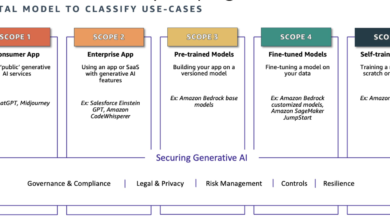Salesforce Data Cloud Vector Database: Bringing Generative AI to the Masses with Low-Code Tools

At the Salesforce World Tour London, the cloud computing giant announced the general availability of its Data Cloud Vector Database, a groundbreaking solution that harnesses the power of unstructured data and generative AI to transform businesses. The announcement comes as part of Salesforce’s ongoing mission to democratize AI and make it accessible to users of all skill levels.
Rahul Auradkar, EVP of Einstein and Data Cloud at Salesforce, emphasized the significance of this release, stating, “For the first time, business users can bring 90% of untapped data to their workflows, which has so far remained unstructured and unused in their enterprise. With the new innovation in Data Cloud, businesses can now grow cost effectively by delivering transformative and integrated customer experiences across service, sales, marketing, AI, automation, and analytics.”
What is Data Cloud Vector Database?
Data Cloud Vector Database is a new capability within Salesforce’s Data Cloud that ingests, stores, and indexes unstructured data using generative AI techniques. By creating embeddings on this unstructured data, the vector database enables semantic querying and seamless integration with structured data in the Einstein platform.
This innovative approach allows businesses to enrich customer profiles with valuable insights from sources such as support tickets, online reviews, and product usage logs. As Auradkar explained, “Customers are using Data Cloud to deliver value across the entire customer lifecycle, from marketing and sales to service and commerce. It’s not just about connecting data, but about making it actionable through AI-driven insights and automation.”
Data Cloud Vector Database also enables businesses to bring unified data directly into AI prompts, powering more relevant and accurate generative AI outputs across Salesforce applications without the need for extensive fine-tuning of large language models.
In addition to the vector database, Salesforce announced several related enhancements to Data Cloud, including a pilot for hybrid search, beta availability of Data Cloud in sandbox environments, and the expansion of Data Cloud on Hyperforce to the United Kingdom.
Seeing Data Cloud Vector Database in Action
During a one-on-one interview, Auradkar provided SalesforceDevops.net an exclusive look at two powerful demos showcasing the potential of Data Cloud Vector Database.
The first demo highlighted the platform’s multi-language capabilities through semantic search. Rahul showed how a service agent could type a case subject in French, and the system would instantly surface semantically similar cases in English. “This is the magic of the semantic query layer that sits on top of the vector database,” Rahul explained. “It understands the context and meaning of the data, regardless of the language.”
In the second demo, Auradkar demonstrated how Data Cloud Vector Database can help solve real-world problems like lost packages. By leveraging semantic search on unstructured case data, an agent was able to quickly identify a specific missing package based on its contents, without manually sifting through countless records. “This is AI in the flow of work,” Rahul emphasized. “The agent didn’t even realize they were using advanced AI techniques like embeddings and semantic search. It just happened seamlessly within the Service Cloud console.”
The Future of Enterprise AI
Salesforce’s Data Cloud Vector Database represents a significant milestone in the company’s journey to make generative AI accessible and actionable for businesses of all sizes. By leveraging low-code tools like Flow Automation, Salesforce is putting the power of advanced AI techniques like retrieval-augmented generation (RAG) into the hands of admins and business users, without the need for extensive data science expertise.
However, the transformative potential of these AI capabilities comes at a cost. Salesforce’s AI services, including those powered by Data Cloud Vector Database, can be expensive, with per-seat charges often exceeding $100 per month. This pricing model may present challenges for businesses looking to scale their AI initiatives and could limit the accessibility of these powerful tools.
When asked about the adoption of Data Cloud Vector Database and its associated AI features, Auradkar acknowledged that they are still in the early stages, stating, “The use cases for generative AI leveraging unstructured data are just getting started, but they show tremendous promise. We’re focusing on delivering pragmatic AI value to our customers today, while also future proofing their investments for the generative AI era.”
As Salesforce continues to innovate and evolve its Einstein platform, businesses can look forward to a future where the transformative potential of AI is within reach for every Trailblazer. The Data Cloud Vector Database announcement marks a significant step forward in democratizing AI and empowering businesses to unlock the full value of their data. However, the company will need to address concerns around pricing and accessibility to ensure that these powerful tools can be widely adopted and drive meaningful impact across industries.
I asked Daniel Svonava, CEO of Superlinked, a San Francisco vector compute and solution vendor about the announcement, is informed about the field because Superlinked publishes a comprehensive analysis of vector databases. Svonava highlights the strategic importance of Salesforce’s move: “With Data Cloud Vector Database, Salesforce is joining the vanguard of data platforms that are harnessing the power of vector embeddings to make their data more accessible and actionable. By bringing together structured and unstructured data in a unified, AI-powered platform, Salesforce is setting the stage for a new era of intelligent applications and customer experiences.
As the enterprise AI landscape continues to evolve, Salesforce’s success will depend on its ability to balance innovation with affordability, ensuring that businesses of all sizes can harness the power of generative AI to drive growth and transform customer experiences.



